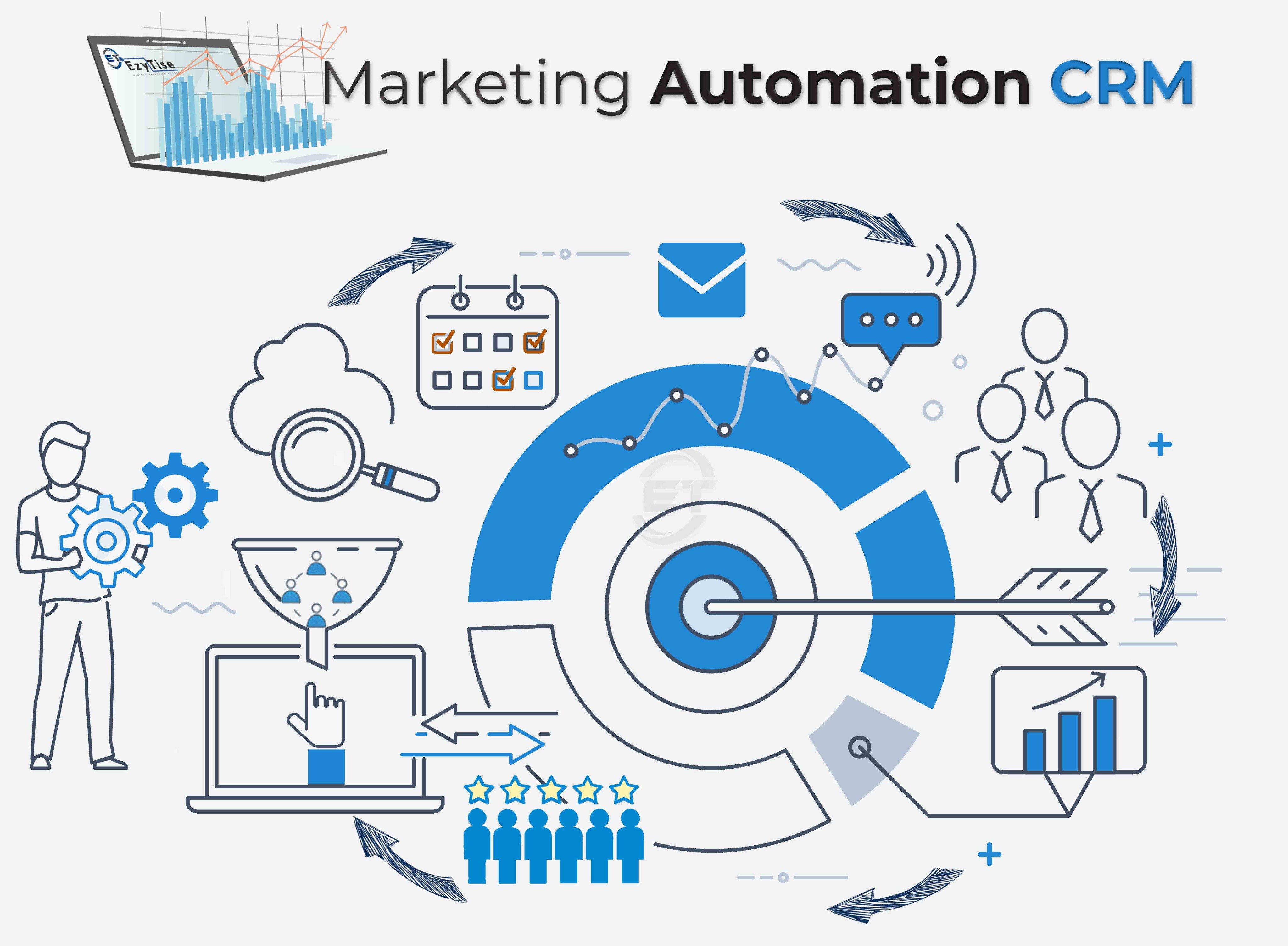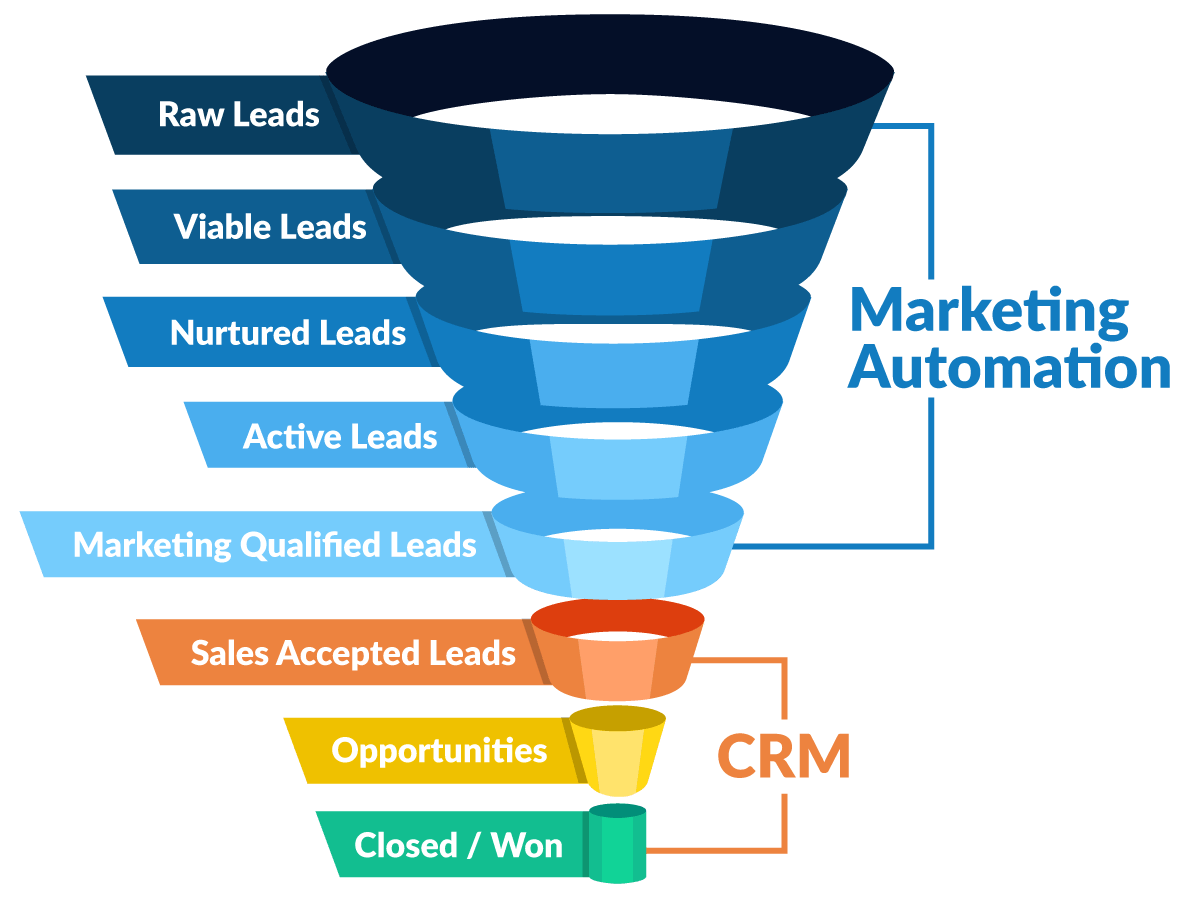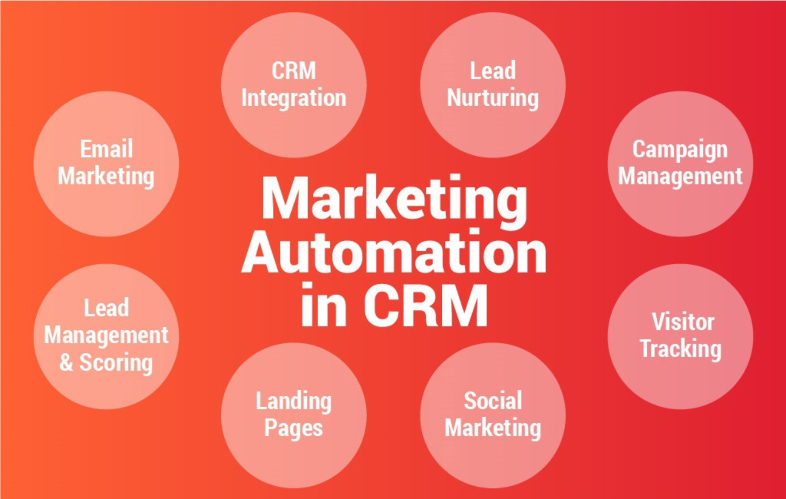Marketing automation in CRM has revolutionized the way businesses manage their marketing and sales processes. By integrating marketing automation tools within CRM systems, organizations can streamline their operations, personalize customer interactions, and generate more qualified leads.
In this comprehensive guide, we will explore the key features, implementation strategies, measurement techniques, and best practices for leveraging marketing automation in CRM to maximize its benefits.
Definition and Overview of Marketing Automation in CRM

Marketing automation refers to the use of software to automate marketing processes and workflows within a CRM (Customer Relationship Management) system. It enables businesses to streamline and enhance their marketing efforts, improving efficiency, personalizing customer experiences, and generating more leads.
Benefits of Marketing Automation in CRM
- Improved Efficiency: Automating repetitive tasks like email marketing, lead scoring, and social media scheduling frees up marketing teams to focus on more strategic initiatives.
- Enhanced Personalization: Marketing automation allows businesses to tailor marketing campaigns based on individual customer data, preferences, and behavior, delivering more relevant and engaging experiences.
- Increased Lead Generation: Automated lead nurturing campaigns can help businesses identify, qualify, and convert leads more effectively, increasing sales opportunities.
Key Features of Marketing Automation in CRM

Marketing automation in CRM empowers businesses with a suite of advanced capabilities designed to streamline marketing processes, enhance customer engagement, and drive growth. These features seamlessly integrate with CRM systems, enabling marketers to automate various tasks, track customer interactions, and gain valuable insights to optimize their campaigns.
Among the core features of marketing automation in CRM are email marketing, lead scoring, and campaign management. Let’s delve into each of these features and explore how they contribute to effective marketing strategies.
Email Marketing
Email marketing remains a powerful channel for reaching and engaging customers. Marketing automation in CRM integrates seamlessly with email marketing tools, allowing businesses to create automated email campaigns, segment their audience based on specific criteria, and track the performance of their email campaigns.
This enables marketers to send targeted, personalized emails that resonate with each customer’s interests and stage in the buying journey.
For instance, a business can set up an automated welcome email sequence to nurture new leads, providing valuable information and encouraging them to take the next step in their customer journey. Additionally, automated email campaigns can be used to promote special offers, announce product launches, or provide exclusive content to loyal customers.
Lead Scoring
Lead scoring is a critical feature of marketing automation in CRM that helps businesses prioritize and qualify their leads. By assigning numerical values to specific customer actions and interactions, such as visiting certain web pages, downloading whitepapers, or engaging with social media content, businesses can create a scoring system that identifies the most promising leads.
This allows sales teams to focus their efforts on the most qualified leads, increasing the chances of converting them into paying customers. For example, a business can assign a higher score to leads who have visited multiple product pages and engaged with customer support, indicating a strong interest in the company’s offerings.
Campaign Management
Campaign management is a comprehensive feature of marketing automation in CRM that enables businesses to plan, execute, and track their marketing campaigns across multiple channels. This includes creating landing pages, designing email campaigns, managing social media campaigns, and tracking the performance of each campaign in real-time.
By centralizing campaign management within the CRM system, businesses gain a holistic view of their marketing efforts and can make informed decisions to optimize their campaigns. For example, marketers can track the conversion rates of different landing pages, analyze the engagement metrics of social media campaigns, and identify areas for improvement.
Implementation and Integration of Marketing Automation in CRM
Implementing and integrating marketing automation into CRM systems is a crucial step towards optimizing marketing and sales alignment. It involves several key steps:
- Data integration:Integrate marketing and sales data to create a comprehensive customer profile. This enables personalized communication and targeted marketing campaigns.
- Workflow automation:Automate repetitive tasks such as lead scoring, email nurturing, and appointment scheduling, freeing up teams to focus on strategic initiatives.
- Lead management:Track leads throughout their journey, from initial contact to conversion, providing valuable insights for lead qualification and nurturing.
- Campaign management:Plan, execute, and track marketing campaigns across multiple channels, ensuring seamless execution and effective campaign performance monitoring.
- Analytics and reporting:Measure the impact of marketing automation initiatives through comprehensive analytics and reporting capabilities, enabling data-driven decision-making and ROI optimization.
Best Practices for Successful Implementation
- Define clear goals and objectives:Establish specific targets for marketing automation initiatives to ensure alignment with overall business objectives.
- Secure stakeholder buy-in:Engage marketing, sales, and IT teams early on to ensure support and collaboration throughout the implementation process.
- Choose the right technology:Select a marketing automation platform that aligns with the organization’s specific needs, integrates seamlessly with CRM, and provides robust functionality.
- Establish a data governance strategy:Implement clear data governance policies to ensure data accuracy, consistency, and accessibility across teams.
- Provide ongoing training and support:Empower teams with the necessary training and resources to maximize the benefits of marketing automation and drive successful adoption.
Measurement and Analytics for Marketing Automation in CRM

Measuring the effectiveness of marketing automation campaigns in CRM is crucial for optimizing results and demonstrating ROI. Key metrics to track include:
Campaign Performance
Open rates, click-through rates, conversion rates, and engagement metrics (e.g., time spent on page)
Lead Generation
Number of qualified leads generated, lead quality, and lead conversion rates
Customer Acquisition Cost (CAC)
Cost per lead and cost per acquired customer
Revenue Generated
Incremental revenue attributed to marketing automation campaigns
Customer Lifetime Value (CLTV)
Value of a customer over their lifetimeBy tracking and analyzing this data, businesses can identify areas for improvement, optimize campaigns, and demonstrate the return on investment (ROI) of their marketing automation efforts.
Dashboards and Reporting Tools
Dashboards and reporting tools provide a comprehensive view of marketing automation performance. They enable users to monitor key metrics, track progress over time, and identify trends. This data-driven approach allows businesses to make informed decisions and adjust campaigns accordingly.
Case Studies and Examples of Successful Marketing Automation in CRM
Marketing automation has proven to be a valuable tool for businesses looking to streamline their marketing and sales processes, enhance customer engagement, and drive revenue growth. Numerous companies have successfully implemented marketing automation in their CRM systems, achieving significant results.
Case Study: Salesforce and Coca-Cola
Coca-Cola, a global beverage giant, partnered with Salesforce to implement Marketing Cloud, a comprehensive marketing automation solution. By leveraging Marketing Cloud, Coca-Cola was able to:
- Increase conversion rates by 25%
- Improve customer satisfaction by 15%
- Enhance sales performance by 10%
The key to Coca-Cola’s success was their strategic approach to marketing automation. They carefully defined their target audience, segmented their customer base, and developed targeted campaigns tailored to each segment. Additionally, they integrated Marketing Cloud with their CRM system, Salesforce, to gain a complete view of customer data and interactions.
Best Practices for Successful Marketing Automation Implementation
Based on the success stories of companies like Coca-Cola, several best practices emerge for successful marketing automation implementation:
- Define clear goals and objectives.
- Segment your customer base.
- Develop targeted campaigns.
- Integrate with your CRM system.
- Monitor and measure results.
By following these best practices, businesses can maximize the benefits of marketing automation and achieve significant improvements in their marketing and sales performance.
Future Trends and Innovations in Marketing Automation in CRM

The future of marketing automation within CRM holds exciting advancements that will reshape the way organizations engage with customers. Emerging technologies, such as artificial intelligence (AI) and machine learning (ML), are poised to revolutionize the field.
AI and ML algorithms can analyze vast amounts of customer data, providing valuable insights into customer behavior, preferences, and trends. This data can be leveraged to create highly personalized and targeted marketing campaigns that resonate with individual customers.
AI-Powered Personalization
- AI-driven chatbots can engage with customers in real-time, offering personalized assistance and recommendations.
- Predictive analytics can identify customers at risk of churn, allowing businesses to intervene proactively with tailored retention strategies.
- Dynamic content optimization ensures that each customer sees the most relevant marketing messages based on their profile and past interactions.
Automation of Repetitive Tasks
- Automated email campaigns can be triggered based on specific customer actions or events, saving time and effort.
- Lead scoring algorithms can prioritize leads based on their engagement and likelihood to convert, enabling sales teams to focus on the most promising prospects.
- Social media monitoring tools can track brand mentions and customer feedback, providing valuable insights for marketing and customer service teams.
Integration with Other Systems, Marketing automation in crm
- Marketing automation can seamlessly integrate with other CRM modules, such as sales, customer service, and finance, creating a unified view of the customer.
- Data sharing between systems enables personalized marketing campaigns that align with customer interactions across multiple channels.
- Third-party integrations with specialized tools, such as marketing analytics platforms, provide additional capabilities to enhance marketing efforts.
Closing Summary
Marketing automation in CRM is an essential tool for businesses looking to enhance their marketing efficiency, personalize customer experiences, and drive sales growth. By embracing the latest trends and innovations, organizations can unlock the full potential of marketing automation and gain a competitive advantage in today’s digital landscape.